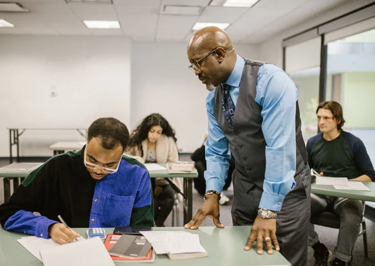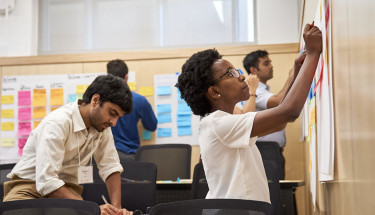Classroom Observations

The Center for Teaching & Learning (CTL) at CU Boulder offers free and confidential classroom observations for educators at all levels. Whether you’re a tenured professor, teaching professor, lecturer, or graduate student instructor, these observations provide supportive and constructive feedback to enhance your teaching practices and improve student learning outcomes through:
- Objective Feedback: Focused insights that are non-evaluative and formative.
- Actionable Strategies: Recommendations you can immediately implement to refine your approach.
- Long-Term Impact: Tools and techniques to create a more student-centered, engaging, and inclusive learning environment.
The deadline for requesting classroom observations each semester is Week 10, and most observations are conducted between Weeks 5-12. Please note that we may not be able to facilitate every request - we typically can accommodate 10-20 requests per semester.
Request a Classroom Observation
Classroom observations create opportunities for personalized feedback and professional growth. They help you:
- Refine teaching techniques to support student engagement and comprehension.
- Address specific teaching challenges through expert insights.
- Experiment with new strategies and evaluate their effectiveness.
- Enhance student learning experiences by creating more inclusive and interactive environments.

We offer various forms of data-driven or qualitative observations that are adaptable to different contexts, e.g., large and small classes, labs, recitations, and modalities (in-person, asynchronous, remote, blended). We can also conduct classroom interviews in concert with an observation or as a standalone process. When seeking a classroom observation, we suggest that you identify a specific or targeted focus, such as equitable teaching practices or student engagement. We can also help you select foci during your pre-observation meeting.
BUFF Classroom Observation Framework
In BUFF-style observations, we use the CTL’s BUFF Classroom Observation Framework, which covers four dimensions of teaching:
Be Prepared
Use Active Learning Strategies
Foster an Inclusive and Equitable Learning Environment
Feedback & Assessments
This framework uses a qualitative approach meant to provide more structure to classroom observations and serves as a conversation starter about teaching and teaching development. Although all four dimensions are important, it is not expected that every course will attend equally to all, or that all dimensions are observable within a single class period. Instead, you and the CTL observer will review and identify foci for the observation during the pre-observation meeting.
Visualizing Instructional Practices (VIP)
In VIP-style observations we use validated observation protocols to gather data on instructor practices, student activities, and student engagement in two-minute intervals across the entire class period. This yields data that can be quantified and visualized in graphics that paint an objective picture of what’s happening in your classes. We currently offer two observation protocols* which can be done standalone, or they can be combined. The COPUS tool captures data on what the instructor and students are doing, using predefined codes (e.g., lecturing, posing questions, moving & guiding, answering questions, listening, group work). The BERI tool uses 10 students as a proxy for overall student engagement – every 2 minutes we make note of what specific engaged or disengaged behavior each student is exhibiting (no identifiable student data are collected and the instructor only sees aggregated data).
Sample VIP COPUS Report Sample VIP BERI Report Sample VIP COPUS + BERI Combined Report
*We are also piloting a protocol to observe language classes when the observer doesn’t speak the target language (COPUL) - if this is of interest to you please reach out to sarah.andrews-1@colorado.edu to learn more.
Classroom Interviews
Classroom interviews are an excellent way to get feedback from your students on which aspects of your course are working well (or not as well) to support your students’ learning, as well as concrete suggestions for improvement. Gathering student feedback at mid-semester – rather than waiting until the end of the semester – allows you to make adjustments while the course is still in progress. In classroom interviews, CTL professional staff will facilitate a conversation with students (you will leave the room) at the end of class. We can adapt the process for 10-35 minutes depending on your goals and the amount of class time you can devote. Classroom Interviews can be done standalone or in combination with either of the VIP-style or BUFF-style classroom observations described above. Note we do not recommend classroom interviews for class sizes greater than approximately 50, though we are happy to consult with you about mid-semester surveys or adaptations for larger class sizes.
Classroom observations are collaborative and flexible, tailored to your teaching goals. Here’s what the process includes:
- Pre-Observation Meeting:
- Discuss your course goals and teaching practices.
- Identify the style of observation that works best for you (e.g., data-driven VIP-style, qualitative BUFF-style, and/or classroom interview).
- Identify specific aspects of teaching you’d like feedback on (e.g., student engagement, classroom dynamics, lesson pacing, technology integration, inclusive practices).
- Observation Session:
- A CTL consultant will attend one or more of your class sessions to observe student-teacher interactions, instructional strategies, and classroom dynamics.
- Post-Observation Feedback:
- Receive detailed feedback highlighting strengths, areas for growth, and practical recommendations for improvement.
- Discuss strategies and resources to address your specific goals.
Ready to Get Started?
Take the next step in enhancing your teaching practices. Please fill out the Classroom Observation Request Form, and let’s work together to create engaging and inclusive learning experiences for your students.
Additional Support
In addition to observations, we offer:
- Consultations: One-on-one meetings to discuss specific challenges or teaching goals.
- Teaching Circles: A new semester-long peer observation program facilitated by CTL professional staff. In Teaching Circles, you build connections with educators across multiple disciplines while gaining valuable formative feedback on your teaching in a supportive environment.
- Workshops and Trainings: Focused sessions on inclusive teaching, active learning, and technology integration.
- Teaching Resources: Access guides, templates, and best practices to improve course design and delivery.
Educator Testimonies
"I found my inclusive pedagogy consultation to be informative, generative and affirming. [I was] offered specific practices I could add to my everyday online teaching as well as ways to alter my course structure to be more responsive to the needs of all my students."
– CU Graduate Student Instructor
"[My consultation] was an enormous help getting me started and comfortable with the new Zoom online teaching. [The CTL staff member] listened very well and helped me solve every issue I confronted. He worked with me every week and truly helped my large lecture class become a success."
– CU Professor
"Thank you very much for your expertise, kindness, and patience during our email exchanges and Zoom chat. You have made time for any and all questions. You have not made me feel hesitant to ask a question or hesitant to state that I do not know something. You have been enthusiastic and sincere in sharing your expertise, sharing the insights that you have gained from others, and walking through things with me."
– CU Instructor

